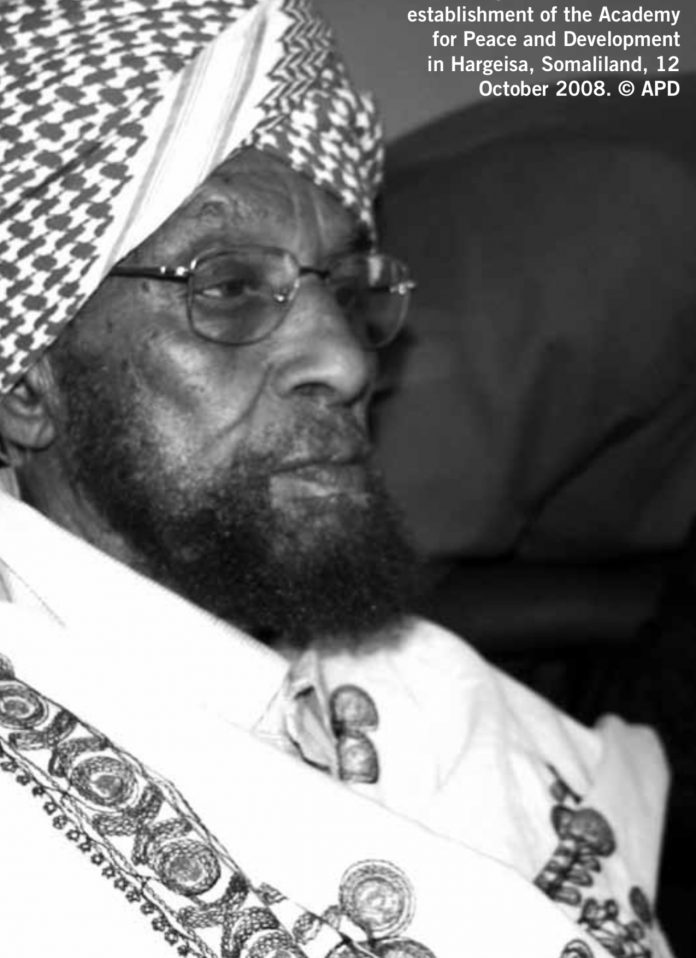Somaliland tried to combine democracy and traditional governance and this formed the basis of the traditional elders’ confusion to adjust their role in order to maintain their significant leadership position within the community.
Similar to many other African countries, Somaliland enjoyed traditional mechanisms of conflict resolution and peace-building processes led by Somali traditional elders in the past centuries. The elders had exercised comprehensive informal systems and regulations to address the community conflicts including clan conflicts, land disputes and livestock fights. Traditional elders practiced the Xeer-Law to govern the social issues, harmonize the conflicting interests of the community and building consensus to their differences. Sultans and Aqils particularly have been the main source of upholding reconciliation processes, bringing stabilization initiatives, maintaining peace and building safer lives to Somali community. They served as a connection bridge between the government and the communities and built sustainable relationships to collaborate their respective roles.
After the collapse of Siyad Barre’s regime in 1991, Somaliland successfully passed different stages of conflicts and encountered a period of civil wars that led to the emergence of number of clan violence triggered by the lust for power and worldly resource allocations. During that episode, they actively engaged in the processes of peace-building, disarmament of rebel groups, re-building of government institutions and healing the trauma of civil wars. For instance, one of the most remembered tasks of Somaliland traditional elders was the holding of Somaliland peace forums from 1991 in an attempt to mark the return of Somaliland Independence from Somalia all the way to setting up the foundations of nationhood to total independent governance. They co-organized peace forums held in the six regions of Somaliland including Burao, Borama and Sahil peace-making conferences. Since then, they have been a point of reference to end any disagreements, and this has made Somaliland to effectively exercise traditional mechanisms of conflict resolution that have many times worked to create a lasting peace and harmony among the parties.
Since the adoption of multi-party systems in 2002 according to the referendum of Somaliland Constitution on May 31, 2001, the role of traditional elders substantially changed as it marked the introduction of new formal governance systems. Somaliland tried to combine democracy and traditional governance structures and this formed the basis of the traditional elders’ confusion to adjust their role in order to maintain their significant leadership position within the community. Yahye Xanas, the Executive Director of Somaliland Journalists Association (SOLJA) argues that “…the leaders shifted their role to align themselves with the new system and the hybrid governance system brought a system of confusion to clearly create borders between the two systems”.
They failed to keep their original role and dived to the politics, engaged in political campaigns, thereby creating a source of tensions to the community – as most of them have nepotistic in they styles and manners of leadership. They now place their interests to come before the interest of the public and the government. Nowadays, traditional elders talk about sensitive issues through media and spread wrong messages to their target audiences bringing divisions and destroying the peaceful cohabitation of Somaliland community.
Also, a significant number of postgraduate students of University of Hargeisa opined that the involvement of traditional elders in the politics is a means of paving ways for political conflict as they bring divisions to their followers. For instance during the 2017 Somaliland Presidential Election, some of the most prestigious Sultans publicly came out to open up long forgotten sensitive hidden issues that created political conflicts, and consequently put a long-lasting negative impact at both regional and district levels. Some of the traditional elders are official agents of political parties and as a result directly perform political party tasks, for example by mobilizing and indoctrinating voters to enable the party to win the election.




























